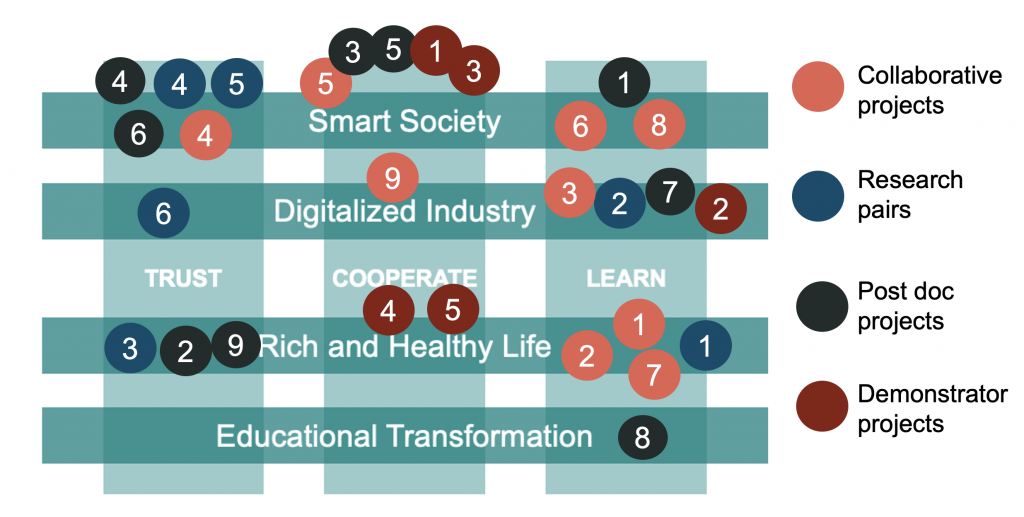
Demonstrator projects – latest addition to Digital Futures Research Programme
Digital Futures funds five 2-year Demonstrator projects adding to the mix consisting of collaborative projects, researcher pairs and post-docs. This means that nearly thirty cross-disciplinary projects are now up and running in total. Demonstrator projects, as the name indicates, have the overall goals to create demonstrators and show the impact of technologies for digital transformation in society.
The demonstrator projects are:
- Democratizing Digital DNA Diagnostics
- Digital Futures Drone Arena
- HumanScatter: Demonstrating Rich and Batteryless Human-Powered Interaction using Backscatter Communication
- iHorse – improving air quality and Health risk forecasts by data-driven modelling of traffic and atmospheric environment
- Susan’s Ride on Campus2030

The above illustration of the Digital Futures’ research matrix has been updated with these new projects. The matrix is a way to present the scope of the research at a high level. The previously existing projects are:
- Nine Collaborative projects that will run for four years, involving nearly 50 established research leaders and their respective research teams. They focus on a range of issues from digital assistants in elderly care and sensitive data handling, to smart solutions for water distribution and programmable robotic microscale material.
-
- Advanced Adaptive Intelligent Systems
- d-Brain: Digitizing Brain Data for Health and Disease
- Data-Limited Learning of Complex Dynamical Systems
- DataLEASH: LEarning And SHaring under Privacy Constraints
- Democritus: Decision Making in Critical Societal Infrastructures
- EO-AI4GlobalChange
- EXTREMUM: Explainable and Ethical Machine Learning for Knowledge Discovery from Medical Data Sources
- Humanizing the Sustainable Smart City (HiSS)
- Robotic Matter
- Six Research pairs breaking new ground in areas ranging from improving the diagnosis and treatment of anxiety disorders to designing threat models for cyber insurance. The funding instrument Research pairs is intended to foster collaboration between two young researchers that have obtained their doctoral degrees, not more than ten years ago. The instrument is aimed to identify new research collaborations that can develop into a leading scientific activity over the next few years. It is a vehicle for supporting and promoting young scholars with the potential to become future digital leaders.
-
- Characterization of the mechanical tissue properties of the brain in the developing brain with magnetic resonance elastography
- Enabling Machine-Learning Intelligence for NetworkCybersecurity
- Layering Trust in Intimate Digital Health Technologies
- Resilient Decentralized Computing: Enabling Trust and Simplicity in Smart Edge Services
- SOS: Empowering User Control over Sensitive IoT Data
- Threat models for cyber insurance
- Nine Postdocs projects are part of the Digital Futures’ mobility program for talented early-career researchers, with two supervisors each from the Digital Futures faculty. Their research covers topics like Digital Transformations for Optimising the Post-Pandemic Sustainable Smart City, Fusion of Radar and Optical Remote Sensing Time Series for Wildfire Monitoring with Deep Learning, Feminist Design of Social Robots and Designing Robots For Young People, With Young People.
-
- Deep Learning Approaches for Long-term Future Forecasting
- Digital Transformations for Optimising the Post-Pandemic SustainableSmart City
- Distributed Optimization and Federated Learning in Emerging Smart Networks
- Foreignness as conceptual framework for interaction design
- Fusion of Radar and Optical Remote Sensing Time Series for WildfireMonitoring with Deep Learning
- How people are making the city smart – the role of algorithms in urban space
- Intelligent wireless communications and high-accuracy positioning systems
- Learning Analytics in Higher education
- On The Feminist Design of Social Robots and Designing Robots For Young People, With Young People
With ongoing calls and evaluations of diversity and inclusion projects and additional postdoc projects, the Digital Futures research programme will soon expand, even more, we’ll keep you posted.


